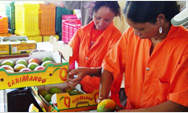 |
 |

 |
 |
 |
|
 |
 |
 |
USAID Information:
External Links:
|
|
 |
 |
|
You are here » Home » Telling Our Story
 |
Farm co-op siezes opportunity by selling specialty coffee and attracts buyers from abroad |
| Coffee Makes a Comeback in El Salvador |
|
Challenge
A surge in coffee production over the past several years has flooded the global market with cheap commercial beans, causing prices to plummet to thirty-year lows. Coffee accounted for only 3.5% of El Salvador’s gross domestic product (GDP) in 2002, compared with about half in 1988. Since 2000, the decreased coffee market caused a loss of 70,000 direct jobs in El Salvador. Coffee crops also have an enormous environmental impact since they represent almost all the forested areas in the country. Coffee crops can contribute to soil and water retention, and serve as an excellent habitat for biodiversity.
|

Photo: Laura Miller
A Salvadoran farmer processes coffee beans.
|
Initiative
With the help of USAID, some farmers in El Salvador are rebounding by breaking into a different market altogether - specialty coffee. To boost returns on coffee and its share of GDP, USAID helped the farmers of Las Lajas, and other cooperatives in El Salvador, improve how they harvested, processed, and marketed the coffee. Cherries, which encase coffee beans, are de-pulped and then fermented and washed. Farmers were taught when to pick ripe cherries and how to sort them before pulping. Farmers were also shown how best to dry and mill coffee beans.
|
By improving the entire process, the cooperative was better able to produce high-quality arabica coffee. Varieties of arabica, a pricier bean than commercial robusta, can be sold as specialty coffee. Working with the Rainforest Alliance, USAID helped show farmers how to treat wash water to protect the environment. This has allowed the Las Lajas cooperative to certify its coffee as environmentally-friendly, boosting the market value of its products and attracting more buyers.
Results
The Las Lajas cooperative’s 230 farmers rebounded and sold five containers of specialty coffee from the 2003 harvest at an average of 26% more per pound than the global market price. The cooperative used the additional revenue - more than $50,000 - to pay off debt incurred at the beginning of the decade while struggling to cover the cost of production. Local exporter Exportadora El Volcan helped connect Las Lajas with Gala, a coffee buyer from the U.K. Not only have these buyers helped Las Lajas increase sales, some have begun to invest in the community to support production. Gala donated $20,000 to the co-op to help Coatepeque, the community that Las Lajas calls home, purchase a water-collection tank so community members have fresh water during the dry season.
Print-friendly version of this page (257kb - PDF)
|
|
|
Back to Top ^
|
|
 |
 |
Fri, 31 Mar 2006 16:57:01 -0500
|
|
 |
 |


